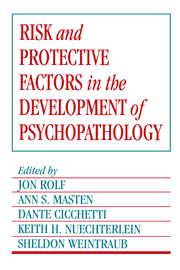Book contents
- Frontmatter
- Contents
- List of contributors
- Preface
- Part I Introduction: Historical and theoretical roots of developmental psychopathology
- Part II Contributions of the high-risk child paradigm: continuities and changes in adaptation during development
- Part III Competence under adversity: individual and family differences in resilience
- Part IV The challenge of adolescence for developmental psychopathology
- 14 The development of psychopathology in adolescence
- 15 Depressive symptoms in late adolescence: a longitudinal perspective on personality antecedents
- 16 Vulnerability and resilience in the age of eating disorders: risk and protective factors for bulimia nervosa
- 17 Protected or vulnerable: the challenges of AIDS to developmental psychopathology
- Part V Factors in the development of schizophrenia and other severe psychopathology in late adolescence and adulthood
- A closing note: Reflections on the future
- Author index
- Subject index
17 - Protected or vulnerable: the challenges of AIDS to developmental psychopathology
Published online by Cambridge University Press: 06 August 2010
- Frontmatter
- Contents
- List of contributors
- Preface
- Part I Introduction: Historical and theoretical roots of developmental psychopathology
- Part II Contributions of the high-risk child paradigm: continuities and changes in adaptation during development
- Part III Competence under adversity: individual and family differences in resilience
- Part IV The challenge of adolescence for developmental psychopathology
- 14 The development of psychopathology in adolescence
- 15 Depressive symptoms in late adolescence: a longitudinal perspective on personality antecedents
- 16 Vulnerability and resilience in the age of eating disorders: risk and protective factors for bulimia nervosa
- 17 Protected or vulnerable: the challenges of AIDS to developmental psychopathology
- Part V Factors in the development of schizophrenia and other severe psychopathology in late adolescence and adulthood
- A closing note: Reflections on the future
- Author index
- Subject index
Summary
The acquired immunodeficiency syndrome (AIDS) plague is truly pandemic and spreading rapidly. It will challenge the coping and adaptive processes of typical and atypical persons at all stages of development, but especially those persons entering adolescence and young adulthood. The AIDS epidemic will cause adapting individuals to significantly alter their timing and experiencing of normative life choices, producing extremes not seen in developed countries since the world wars and the Great Depression. The epidemic's relevance to developmental psychopathology is clear, because studying developmental risk and protective processes during normative and nonnormative stressful life transitions is this discipline's core research strategy.
Developmental psychopathology as an emerging field has been defined and described in various ways in this volume. There is agreement that it should combine the methods and perspectives of clinical and normal developmental research in order for its practitioners to understand adaptation during development over the life span. The criteria for subject selection in order to demonstrate risk and protection differ, as would be expected for an interdisciplinary field. Typically, subjects have been selected for study on the basis of their possession of personal (e.g., biological or behavioral) attributes or exposure to contextual (e.g., family, peer group, and community) factors hypothesized to affect adaptation positively or negatively. For developmental psychopathologists, the AIDS epidemic will be a time for intensive efforts with new descriptive research, but it must also be a time for commitment to leading preventive intervention efforts. This chapter outlines how the developmental psychopathology research variables involving risk, vulnerability, and protection can be applied to the AIDS challenge and adapted for lifesaving preventive interventions.
- Type
- Chapter
- Information
- Publisher: Cambridge University PressPrint publication year: 1990
- 4
- Cited by



